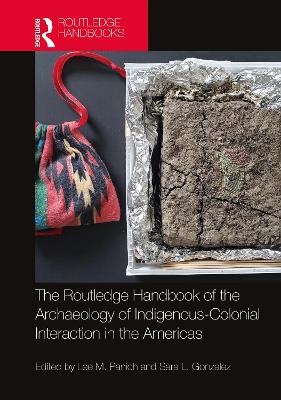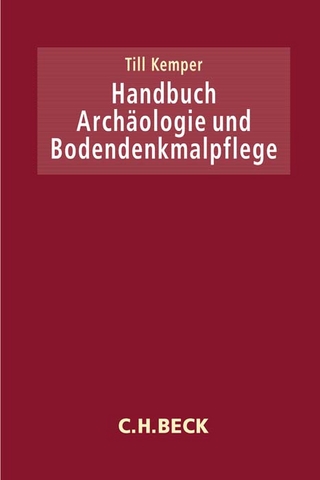
Routledge Handbook of the Archaeology of Indigenous-Colonial Interaction in the Americas
Routledge (Verlag)
978-0-367-22282-6 (ISBN)
- Titel z.Zt. nicht lieferbar
- Versandkostenfrei innerhalb Deutschlands
- Auch auf Rechnung
- Verfügbarkeit in der Filiale vor Ort prüfen
- Artikel merken
The contributions offer a comprehensive look at where the archaeology of colonialism has been and where it is heading. Geographically diverse case studies highlight longstanding theoretical and methodological issues as well as emerging topics in the field. The organization of chapters by key issues and topics, rather than by geography, fosters exploration of the commonalities and contrasts between historical contingencies and scholarly interpretations. Throughout the volume, Indigenous and non-Indigenous contributors grapple with the continued colonial nature of archaeology and highlight Native perspectives on the potential of using archaeology to remember and tell colonial histories.
This volume is the ideal starting point for students interested in how archaeology can illuminate Indigenous agency in colonial settings. Professionals, including academic and cultural resource management archaeologists, will find it a convenient reference for a range of topics related to the archaeology of colonialism in the Americas.
Lee M. Panich is an associate professor of anthropology at Santa Clara University. In his research, he employs a combination of archaeological, ethnographic, and archival data to examine the long-term entanglements between California’s Indigenous societies and colonial institutions, particularly the Spanish mission system. Sara L. Gonzalez is an associate professor of anthropology at the University of Washington and Curator of Archaeology the Burke Museum of Natural History and Culture. An anthropological archaeologist by training, she works at the intersection of Indigenous studies, tribal historic preservation, and public history.
Part I: Methodological and Theoretical Foundations; 1. Situating Archaeological Approaches to Indigenous-Colonial Interaction in the Americas: An Introduction; 2. Deep Histories and the Archaeology of Colonialism; 3. A Double Coloniality: The Modern/Colonial Underpinnings of Mission Archaeology in South America; 4. Colonialism and Indigenous Population Decline in the Americas; 5. Climate and Colonialism in the Americas: Comparing Exemplary Cases; 6. Colonialism and Historical Ecology: Livestock Management as a Case Study in the American Southwest; 7. Interpreting Documentary and Archaeological Evidence: Intercultural Interactions in Santafé de Bogotá (Colombia); 8. Theorizing Indigenous-Colonial Interactions in the Americas; Part II: Core Issues and Topics; 9. Pathways to Persistence: Divergent Native Engagements with Sustained Colonial Permutations in North America; 10. African-Indigenous Interactions in Colonial America: From Divisions to Dialogue; 11. Indigenous Negotiations of Missionization and Religious Conversion; 12. Labor and Natural Resource Extraction in Spanish Colonial Contexts; 13. Objects of Change? Revisiting Native Material Culture and Technological Traditions in the Post-1492 Americas; 14. The Archaeology of Conquest and Accommodation: A View from the Valley of Mexico; Part III: Archaeological Explorations of Native-Lived Colonialisms; 15. Social Networks and Colonial Adaptation in the Caribbean; 16. Indigenous Persistence in the Face of Imperialism: Andean Case Studies; 17. Reconceptualizing the Wichita Middle Ground in the Southern Plains; 18. Indios Bárbaros: Nomad-Spanish Interactions on the Northern Frontier of New Spain; 19. Indigenous Agency and Limits to the Colonial Order in South America; 20. Landscapes of Strategic Mobility in Central America: San Pedro Siris During the Caste War; 21. The Adorned Body in French Colonial Louisiana: Exploring Cosmopolitan Materialities of Bodily Objects; 22. "Politics of Regard" and the Meaning of Things: The Persistence of Ceramic and Agroforestry Practices by Women in São Paulo; 23. From Hybridity to Relationality: Shifting Perspectives on the Archaeology of Métis Emergence; 24. Battling the Alamo: Toward Preservation and Protection of Coahuiltecan Legacies and Camposantos; 25. Lived Heritage of Colonialism at Tahcabo, Yucatán, México; 26. Monumentalizing Nipmuc Heritage and Emplacing Indigenous Presence; Part IV: Decolonial Futures; 27. In Small Islands Forgotten: Lessons from Chamorro Lands; 28. Unsettling the Archaeology of Reservations: A View from Grand Ronde, Oregon; 29. Survivance Storytelling in Archaeology; 30. The Hoofed Clan Story and Storywork: Red Lake Ojibwe Foodways and Indigenous Food Sovereignty; 31. Indigenous Archaeological Approaches and the Refusal of Colonialism in Archaeology; 32. The Limits of Repatriation’s Decolonizing Abilities; 33. Changing Museum Narratives: A Conversation with Culture Curators at the Burke Museum of Natural History and Culture
| Erscheinungsdatum | 21.07.2021 |
|---|---|
| Zusatzinfo | 12 Tables, black and white; 6 Line drawings, black and white; 51 Halftones, black and white; 57 Illustrations, black and white |
| Verlagsort | London |
| Sprache | englisch |
| Maße | 174 x 246 mm |
| Gewicht | 1230 g |
| Themenwelt | Geisteswissenschaften ► Archäologie |
| ISBN-10 | 0-367-22282-5 / 0367222825 |
| ISBN-13 | 978-0-367-22282-6 / 9780367222826 |
| Zustand | Neuware |
| Informationen gemäß Produktsicherheitsverordnung (GPSR) | |
| Haben Sie eine Frage zum Produkt? |
aus dem Bereich


